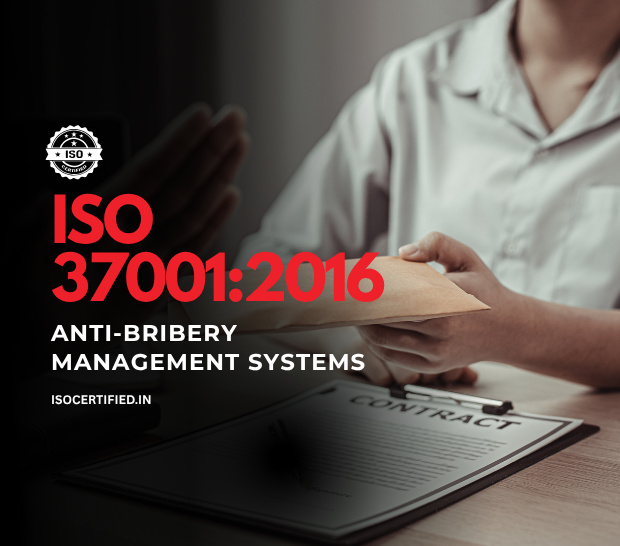- Globally Recognized Certification
ISO 37001:2016 - Anti-Bribery Management Systems
ISO 37001 Anti-Bribery Management Systems Certification establishes comprehensive frameworks preventing, detecting, and addressing bribery risks through systematic controls, ethical culture, and compliance procedures. This standard demonstrates organizational commitment to transparent business practices, legal compliance, and zero-tolerance approach to corruption across all operations and business relationships.
Request A Free Quote
What is ISO 37001 – Anti-Bribery Management Systems Certification
ISO 37001 Certification is an internationally recognized anti-bribery management system standard providing requirements and guidance for establishing, implementing, maintaining, and improving programs preventing bribery in public, private, and non-profit sectors. This certification mandates anti-bribery policies, risk assessment procedures, due diligence on business associates, financial controls, training programs, whistleblowing mechanisms, investigation procedures, and continuous monitoring systems. The standard addresses direct and indirect bribery involving employees, contractors, agents, and business partners ensuring comprehensive coverage across organizational activities, supply chains, and third-party relationships including joint ventures and acquisitions.
The certification process requires appointing compliance functions with independence and authority, conducting regular bribery risk assessments across operations and jurisdictions, implementing proportionate controls addressing identified risks, establishing clear reporting channels, maintaining detailed records, and demonstrating top management commitment to anti-bribery culture. Certified organizations must provide role-specific training, conduct due diligence before engaging third parties, monitor transactions for suspicious patterns, investigate allegations promptly, and take corrective actions when violations occur. ISO 37001 compliance helps organizations meet legal obligations under UK Bribery Act, US Foreign Corrupt Practices Act, and similar anti-corruption legislation worldwide.

- Benifits
Key Benefits of ISO 37001 Certification
This certification protects against legal prosecution and financial penalties, enhances business reputation, provides competitive advantage in procurement processes, and demonstrates ethical commitment that builds stakeholder trust and investor confidence.
Legal Risk Mitigation
Reduce exposure to criminal prosecution, regulatory penalties, and civil litigation by demonstrating reasonable procedures preventing bribery and corruption.
Reputation Protection Enhancement
Safeguard brand value and organizational credibility through certified anti-corruption commitment that prevents reputational damage from bribery scandals.
Competitive Procurement Advantage
Meet tender requirements and ethical sourcing standards increasingly demanded by governments, corporations, and development organizations in supplier selection.
Stakeholder Confidence Building
Strengthen trust with investors, partners, customers, and regulators through transparent anti-bribery systems demonstrating ethical business conduct commitment.
- Standard Process
Your Path to ISO Certification
Four straightforward steps to achieve ISO certification: consultation, documentation, payment, and certificate delivery—all managed remotely for your convenience.
Free Consultation
Connect with our ISO experts to discuss your certification needs and requirements.
E-mail Documents
Submit your organization's documents and information securely via email.
Make Payment Online
Complete your payment conveniently through our secure online payment gateway.
Get ISO Certificate
Receive your internationally recognized ISO certification upon successful audit completion.
- Which Industries?
Who Needs This
Organizations operating in high-risk corruption sectors, companies with international operations in challenging jurisdictions, government contractors, and businesses with extensive third-party networks require ISO 37001 certification. Corporations seeking ethical differentiation and compliance assurance benefit substantially.
Oil & Gas Exploration
Defense & Government Contracting
Pharmaceutical & Healthcare
Construction & Infrastructure Development
- Ongoing Requirements
Compliance & Maintenance
Post-certification, organizations must fulfill ongoing requirements including annual surveillance audits, internal reviews, and recertification to maintain their ISO certificate validity.
Annual Surveillance Audits
Certification bodies conduct yearly audits to verify continuous compliance with ISO standards and ensure your management system remains effective and up-to-date.
Recertification Every 3 Years
Complete recertification audit required every three years to renew your ISO certificate and demonstrate sustained commitment to quality management excellence.
Internal Audits & Reviews
Regular internal audits and management reviews must be conducted to monitor performance, identify improvements, and prepare for external certification audits.
Documentation & Training Updates
Maintain current documentation, update procedures for process changes, and provide ongoing training to employees on ISO requirements and their responsibilities.
